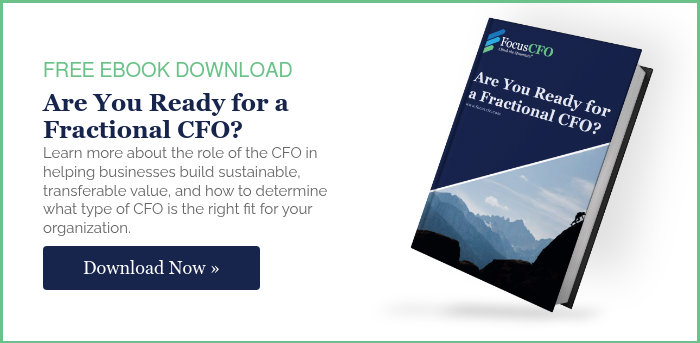The world has seen disruption like never before due to the Covid-19 pandemic and experienced fractionalization and structural disruption in many industries; some of the best results being Zoom video conferencing, DoorDash food delivery and any retailer that was able to pivot their business to online ordering and delivery. The business models are all unique in their implementation, based on insightful changes to how goods and services are purchased and delivered. In fact, these new models became equally (or perhaps more) effective for the consumer.
Another disruption, the use of fractional executives, is also on the rise. Small businesses suddenly become more competitive with larger businesses, because they are able to utilize seasoned executives too. These fractional executives work part-time, and are usually in the second half of their career, bringing a life-time of experience and knowledge to help small businesses with strategy, analysis and building value. They come in all the favorite varieties like CMO, COO, CTO and CFO. This article will review the role of the fractional CFO.
Setting the Stage
The term Chief Financial Officer (CFO) is used to describe a senior level executive, typically with 20+ years of experience, who is fluent in strategy, capital markets and banking, acquisitions, budgeting, forecasting, and forward planning. They have insights based on their experience in sales, marketing, engineering, and operations. A CFO’s focus is on assuring that the company’s profitability, growth plans, capital structure, and short- and long-term strategic action plans are consistent, coherent, and are building value for the shareholders. The CFO works intensely on the financial health of the company, but is not the one primarily focused on financial reporting (the controller). Most companies under $50M in sales do not employ a Chief Financial Officer (some will have a controller with that title) due to the relatively high expense of a CFO.
CFO vs Controller vs Accountant vs Bookkeeper
In most smaller businesses the role of CFO gets blended with the role of controller; the same person is chartered with the management of the cash cycle (AR/AP) and financial reporting, and in their spare time between the daily pressures, is expected to change gears and time horizons and look to the future, dive deep into profitability or capital planning. While on average these true CFO tasks may entail a day a week, experience shows that the forward planning and deep analytical “CFO” tasks are often deferred, short changed, or tackled only once a crisis has arrived.
Enter a fractional CFO, who can be laser focused on key performance indicators (KPIs), strategy and analysis. The premise of a fractional CFO(f-CFO) is to engage the highest possible skill set and experience base to “work” the CFO tasks, typically one day a week, and allow the financial accounting staff to “work” the daily routines and reporting mechanics. Depending on the size of the business, the finance team may be “f-CFO plus controller”, “f-CFO plus senior accountant”, or even “f-CFO plus bookkeeper”. This is a mighty combination of skills that should give the entrepreneur/business owner a level of confidence and security. Knowing your numbers and having a plan for the future, will provide the best chance of having predictable cash flow, and best managing business risk, and providing focus on accelerating growth and value.
Disruptive business models typically offer a large step-up in value to the buyer. The business owner can now engage seasoned c-Suite level help, at an affordable price, by engaging a fractional executive. Almost like a free doughnut with your coffee!
Todd Peter is a Principal with FocusCFO based in Cleveland.






